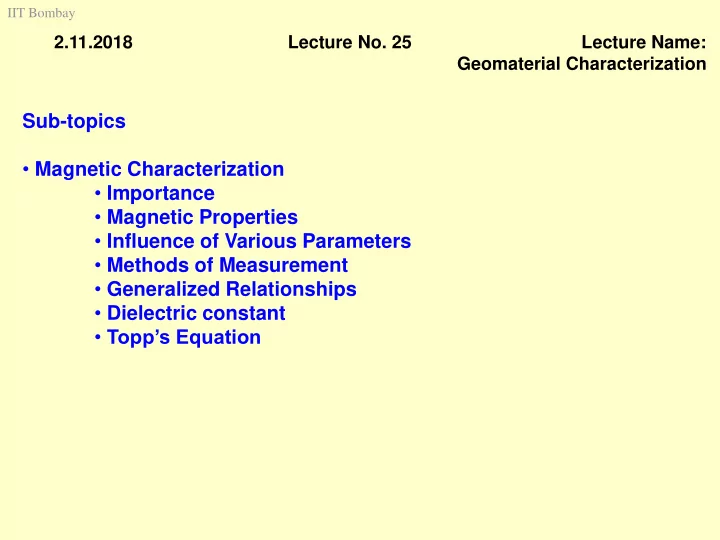

IIT Bombay 2.11.2018 Lecture No. 25 Lecture Name: Geomaterial Characterization Sub-topics • Magnetic Characterization • Importance • Magnetic Properties • Influence of Various Parameters • Methods of Measurement • Generalized Relationships • Dielectric constant • Topp’s Equation
Determination of Soil Moisture Content Classical Techniques Modern Techniques Thermo gravimetric Infrared moisture balance Calcium carbide Neutron Scattering Gamma attenuation Heat pulse sensors Micro-Electro-Mechanical Optical Time Domain Reflectometric Capacitance technique
Critical Appraisal • Dielectric techniques have been found to be the most contemporary techniques • Multi-phase mineralogical composition of the soil • Magnetic effect of the soil • The applicability to soils of entirely different characteristics • No holistic approach for obtaining soil moisture content Susha Lekshmi S.U., D. N., Singh and Maryam S Baghini. (2014). "A Critical Review of Soil Moisture Measurement", Measurement , Vol. 54, pp: 92-105 3
Basic ic Philo ilosophy Soil Moisture content= f(dielectric constant) Comparison of Influence of soil TDR and CT magnetism techniques
Influence of soil magnetic characteristics Trial 1 0.2 Trial 2 Saturation Magnetization ( SM ) Magnetic moment, M (emu/g) 0.1 Reproducible results M (emu/g) Remnant Magnetization (+ RM ) AH 0.0 AH Coercivity (- CR ) -0.1 +CR Magnetic field, H (Oe) -RM -0.2 Irregularities -8000 -6000 -4000 -2000 0 2000 4000 6000 8000 H (Oe) Vibrating Sample Magnetometer -3 Tesla to 3 Tesla @ ambient temperature
Magnetic response of pure metal oxides 0.8 Standard Oxide Fe 2 O 3 Al 2 O 3 0.4 SiO 2 M (emu/g) 0.0 -0.4 -0.8 -30000 -15000 0 15000 30000 H (Oe) Fe 2 O 3 exhibits magnetic hysteresis 6
Relationship between AH , K a-mineral , K a-Expt and θ 20 AH <0.3 0.3< AH <5 AH >5 16 12 K a-mineral 8 4 0.05 K a-mineral =10 AH 0 -3 -2 -1 0 1 2 3 10 10 10 10 10 10 10 AH Susha Lekshmi S. U., Singh, D.N. , Tarantino, A. and Baghini, M.S., “Investigations on Magnetic Characteristics of the Soil and their Influence on its Dielectric Response”, 7 Applied Clay Science, 2018, 158, pp. 113-122.
Comparis ison of dif ifferent die iele lectric techniq iques • TDR and Capacitance techniques TDR wavefor m TDR probe Step pulse generator, Oscilloscope and timing device Compacted soil mass Capacitance Technique: TDR: Campbell scientific TDR CS 640 8 Decagon Device 5TE
Comparison of (a) θ CT with θ TDR and (b) σ a-CT with σ a-TDR 100 5000 SOIL (b) S1 d =1.2g/cc (a) S2 d =1.2g/cc 4000 S3 d =1.3g/cc 80 S4 d =1.3g/cc S5 d =1.1g/cc 3000 60 (%) CT ( S/cm) CT 2000 40 R2=0.91 1000 CT =1.25 TDR 20 R2= 0.98 0 CT = 0.58 TDR 0 0 1000 2000 3000 4000 5000 0 20 40 60 80 100 TDR ( S/cm) TDR (%)
Variation of (a) K a-TDR , (b) K a-CT with θ c Soil, d (in g/cc) S1, 1.2 S2, 1.2 S3, 1.3 S4, 1.3 S5, 1.1 80 80 (a) (b) 60 60 K a-TDR 40 40 K a-CT R 2 = 0.92 20 20 K a-TDR = 5.1 e 0.04 c R2= 0.87 K a-CT = 4.09 e0.03 c 0 0 0 20 40 60 80 100 0 20 40 60 80 100 θ c 10
Comparison of the dielectric constants obtained from different methods 80 80 (a) (b) 60 60 45 line 45 line 2 =0.96 R K a-Topp K a-Topp K a-Topp = 1.64 K a-CT 40 40 20 20 2 =0.98 R K a-Topp =0.82 K a-TDR 0 0 0 20 40 60 80 0 20 40 60 80 K a-TDR K a-CT 80 80 (c) (d) 60 60 45 line K a-Topp 45 line 40 K a-CT 40 20 20 R2=0.96 K a-Topp = 0.75 K a-TP R2=0.98 Ka-CT=0.45 K a-TP 0 0 20 40 60 80 0 0 20 40 60 80 K a-TP K a-TP 𝐿 a − TP = 1 − ƞ · 𝑁 1 · 𝐿 𝑁 1 + 𝑁 2 · 𝐿 𝑁 2 + ƞ · 𝑇 𝑠 · 𝐿 𝑄𝐺 1 + 1 − 𝑇 𝑠 · 𝐿 𝑄𝐺 2
Comparison of the dielectric constants obtained from different methods 80 (e) 60 45 line K a-TDR 40 R 2 =0.95 20 K a-TDR =0.89 K a-TP 0 0 20 40 60 80 K a-TP 12
Recommend
More recommend